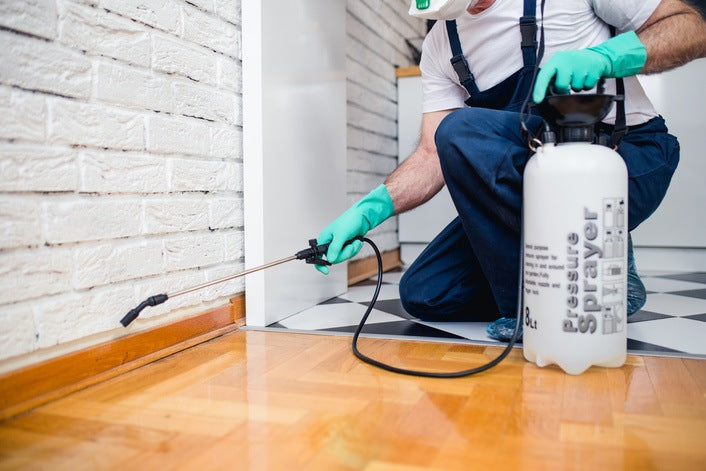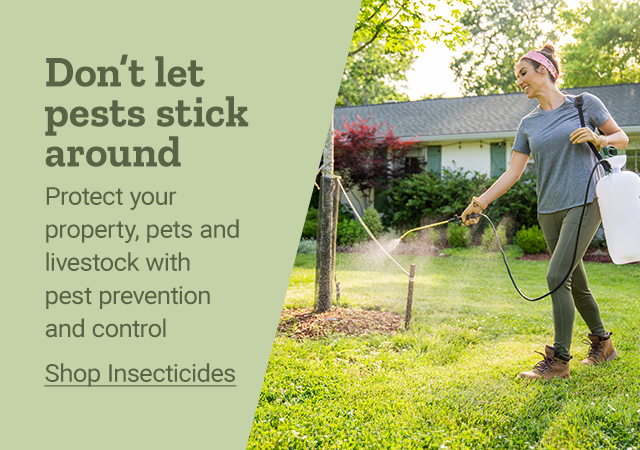Reveal the Significance of Pest Control in Keeping a Healthy And Balanced Atmosphere and Therapy Techniques

The Role of Parasites in Communities
Parasites, often seen entirely as problems, play a complex role in ecosystems that is essential for maintaining eco-friendly balance. They contribute substantially to different eco-friendly procedures, consisting of pollination, nutrition cycling, and insect control. Numerous insect varieties, such as bees and butterflies, are important pollinators for a vast range of plants, which in turn supports biodiversity and food manufacturing.
Additionally, bugs serve as target for various predators, creating a vital web link in food webs. This connection makes certain the survival of different species and aids manage populations within ecological communities (Termite treatment Port Charlotte). Decomposer pests, such as specific beetles and fungis, are instrumental in breaking down organic matter, thus enriching soil and helping with vitamins and mineral recycling.
On the other hand, while parasites can be helpful, their overpopulation or intrusion into non-native settings might interrupt these eco-friendly functions. This intricacy highlights the relevance of understanding insect dynamics, as efficient insect monitoring methods must take into consideration both their eco-friendly duties and prospective effect on human activities. Balancing pest existence while reducing injury is necessary for preserving the integrity of communities and making certain farming performance.
Health And Wellness Risks Connected With Parasites
The existence of bugs in different settings prolongs beyond their environmental roles, as they likewise present considerable health and wellness dangers to pets and people. Lots of parasites, consisting of insects, rodents, and parasites, are providers of illness that can have severe health and wellness implications. Rats are recognized to transmit hantavirus and leptospirosis, both of which can lead to extreme respiratory and renal concerns, specifically.
Pests such as ticks and insects are notorious for spreading vector-borne conditions like jungle fever, dengue high temperature, and Lyme illness. These diseases can lead to high morbidity and death prices, particularly in prone populaces. Furthermore, parasites like roaches and insects can intensify allergies and asthma, adding to breathing issues in people, specifically those with pre-existing conditions.
Furthermore, the presence of insects can lead to psychological stress and pain, impacting general wellness. Contamination of food and surfaces by insect droppings and continues to be can result in foodborne ailments, highlighting the value of keeping sanitary conditions. Understanding the health threats connected with bugs is critical in acknowledging the necessity of efficient bug monitoring strategies to secure animal and human wellness.

Advantages of Effective Parasite Control
Effective parasite control is essential for maintaining a healthy and risk-free setting, as it constantly minimizes the numerous risks connected with bug infestations. Among the primary benefits of efficient insect administration is the decrease of carcinogen. Bugs such as cockroaches, insects, and rodents are vectors for conditions that can impact both humans and animals. By managing these populaces, the possibility of disease transmission is dramatically reduced.
Furthermore, efficient bug control safeguards home and frameworks from damage. Many parasites, like termites and woodworker ants, can trigger substantial structural damages that may need costly repairs. By proactively taking care of these invasions, property owners and organizations can secure their investments.
One more significant benefit fire ants is the enhancement of general lifestyle. A pest-free environment adds to psychological well-being and lowers tension connected with problems. Furthermore, effective bug control promotes a safer atmosphere for family pets and children, making sure that homes remain havens devoid of dangerous chemicals and disease-causing microorganisms.
Usual Pest Control Strategies

In the world of pest management, numerous methods are utilized to combat problems successfully. These strategies can be broadly classified into three major techniques: social, mechanical, and chemical controls.
Social control entails changing practices to lower pest reproduction, survival, and establishment. This may include crop turning, appropriate cleanliness, and habitat manipulation, which jointly create an environment less for pest proliferation.
Mechanical control uses physical techniques to get rid of parasites (Termite treatment Port Charlotte). Strategies such as vacuum cleaners, barriers, and traps are generally made use of to straight eliminate bugs from an area. This strategy is especially reliable for taking care of rats and bugs without making use of dangerous chemicals
Chemical control includes the application of pesticides to manage bugs. These compounds can be classified right into fungicides, pesticides, and herbicides, each targeting specific kinds of pests. It is critical to use these chemicals deliberately, adhering to This Site safety standards and regulations to lessen possible damage to non-target varieties and the setting.
Each bug control technique has its benefits and limitations, and commonly, an incorporated technique integrating multiple techniques yields the most effective results in maintaining a pest-free environment.
Lasting Parasite Management Practices
Lasting bug management methods include a variety of approaches made to reduce environmental impact while efficiently managing parasite populations. These methods focus on making use of environmentally pleasant approaches over chemical pesticides, consequently minimizing the risk of damage to non-target species, including helpful insects, wildlife, and people.
Integrated Bug Management (IPM) is a keystone of sustainable techniques, combining biological, cultural, mechanical, and chemical techniques to manage parasites. For example, biological control entails presenting all-natural killers or parasites to reduce pest populaces. Social techniques, such as plant rotation and polyculture, disrupt pest life process and boost ecosystem durability.
Mechanical techniques, such as barriers or catches, can successfully avoid pest gain access to without chemical treatment. Additionally, preserving healthy communities with correct soil management, plant health, and biodiversity can naturally minimize parasite issues.
Education and understanding are essential components, empowering individuals and communities to recognize insect hazards early and implement preventive actions. Termite treatment Port Charlotte. By promoting an all natural method that stabilizes her response pest control with eco-friendly integrity, lasting pest management techniques not only safeguard plants and frameworks but also add to a much healthier environment for future generations
Verdict

Comprehending the health and wellness risks linked with bugs is critical in acknowledging the requirement of efficient pest administration approaches to safeguard human and animal wellness.
Reliable parasite control is important for preserving a healthy and risk-free setting, as it consistently mitigates the many dangers associated with pest infestations.Integrated Parasite Administration (IPM) is a cornerstone of lasting techniques, incorporating biological, cultural, mechanical, and chemical methods to take care of insects. By recognizing the role of parasites, recognizing connected health risks, and using varied therapy methods, a lasting method to pest management can be attained. Integrated Parasite Administration (IPM) highlights an all natural technique that alleviates harm to useful microorganisms while efficiently managing pest populations.